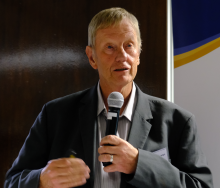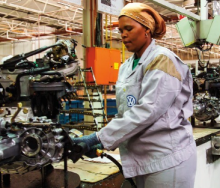South African business leaders have expressed a slight boost of positivity regarding the country’s economic prospects, according to the latest RMB/BER Business Confidence Index (BCI).
Following a five-point increase in the second quarter, the RMB/BER BCI, released on Wednesday, rose by another three points to reach 38 in the third quarter of 2024.
This is the first business sentiment survey following the formation of the Government of National Unity and reflects “cautious optimism” about improving business conditions, the index report noted.
“Although respondents still noted constraints, especially weak demand, they were less negative about current conditions and, encouragingly, were more upbeat about business conditions going forward,” the report noted.
For the first time since early 2022, a slight net majority of respondents across the different sectors expect business conditions to improve in the next quarter.
The three-point increase brought the composite RMB/BER BCI to the best level since the fourth quarter of 2022, when confidence was also at 38 points.
At the current level, just under four out of ten respondents were satisfied with prevailing business conditions.
Of the five sectors making up the BCI, wholesalers and building contractors saw a decline in confidence, although remaining at relatively high levels, manufacturing remained unchanged, and retailers and new vehicle dealers showed an improvement in confidence.
New vehicle dealers registered the biggest increase in confidence, rising 17 points to 27 in the third quarter, a one-year high. However, despite the big surge, the sector remains the most pessimistic with fewer than three in ten respondents satisfied with prevailing business conditions.
Business confidence in the sector has been extremely depressed over the last three quarters, with fewer than two in ten surveyed respondents satisfied with prevailing business conditions.
“Be that as it may, the sector seems to have bottomed and is slowly recovering. Moderating inflation and the associated reduction in policy interest rates should provide a boost to household disposable income and support the uptick,” the report noted.
Despite a two-point drop from the second quarter, the wholesale trade was still the most optimistic sector surveyed, with just over half of respondents satisfied with prevailing business conditions. At 51%, this is six points better than the long-term average reading of 45%, which is supported by underlying data that generally reflects upbeat conditions.
While total sales volumes were unchanged from the second quarter, underlying trends moved in opposite directions.
Wholesalers of consumer goods noted lower sales relative to the second quarter, albeit still performing better than the long-term average. On the other hand, wholesalers of non-consumer goods reported that sales performed better than in the second quarter, with volumes now in line with the long-term average reading.
Retail trader confidence improved from its long-term average of 39 index points to an above average 45 index points in the third quarter.
However, building contractor confidence fell by six points to 41 index points after a five-point increase in the second quarter.
Manufacturing sector confidence remained unchanged at 28 index points although conditions deteriorated, with a decline in export and domestic demand contributing to a drop in production.
According to the report, the overall improvement in business sentiment was supported by the continued absence of load shedding and political certainty following the May 29 election.
“However, with continued pressure on local consumers observed across the sectors and sluggish export demand noted by manufacturers, there was not enough demand to fuel a faster uptick in sentiment. Indeed, broadly speaking, activity did not materially improve compared with the second quarter,” the report noted.
RMB chief economist Isaah Mhlanga said he anticipated domestic demand to improve during the remainder of the year.
“Fortunately, the widely anticipated interest rate cut in South Africa later this month, on the back of lower consumer inflation, and a boost from the introduction of the two-pot retirement system should spur domestic demand through the remainder of the year,” Mhlanga said.
“This should benefit sentiment, but logistical constraints remain top of mind and will need to be urgently tackled to support a sustained lift in business confidence.”
Statistics South Africa data released this week showed a slight 0.4% quarter-on-quarter growth in GDP in the second quarter.













